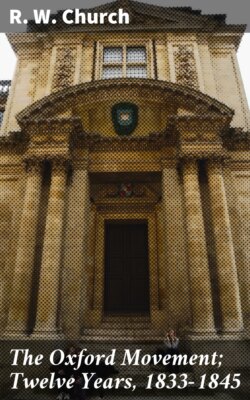Читать книгу The Oxford Movement; Twelve Years, 1833-1845 - R. W. Church - Страница 3
На сайте Литреса книга снята с продажи.
PREFACE
ОглавлениеTable of Contents
The following pages relate to that stage in the Church revival of this century which is familiarly known as the Oxford Movement, or, to use its nickname, the Tractarian Movement. Various side influences and conditions affected it at its beginning and in its course; but the impelling and governing force was, throughout the years with which these pages are concerned, at Oxford. It was naturally and justly associated with Oxford, from which it received some of its most marked characteristics. Oxford men started it and guided it. At Oxford were raised its first hopes, and Oxford was the scene of its first successes. At Oxford were its deep disappointments, and its apparently fatal defeat. And it won and lost, as a champion of English theology and religion, a man of genius, whose name is among the illustrious names of his age, a name which will always be connected with modern Oxford, and is likely to be long remembered wherever the English language is studied.
We are sometimes told that enough has been written about the Oxford Movement, and that the world is rather tired of the subject. A good deal has certainly been both said and written about it, and more is probably still to come; and it is true that other interests, more immediate or more attractive, have thrown into the background what is severed from us by the interval of half a century. Still that movement had a good deal to do with what is going on in everyday life among us now; and feelings both of hostility to it, and of sympathy with it, are still lively and keen among those to whom religion is a serious subject, and even among some who are neutral in the questions which it raised, but who find in it a study of thought and character. I myself doubt whether the interest of it is so exhausted as is sometimes assumed. If it is, these pages will soon find their appropriate resting-place. But I venture to present them, because, though a good many judgments upon the movement have been put forth, they have come mostly from those who have been more or less avowedly opposed to it.[1] The men of most account among those who were attracted by it and represented it have, with one illustrious exception, passed away. A survivor of the generation which it stirred so deeply may not have much that is new to tell about it. He may not be able to affect much the judgment which will finally be accepted about it. But the fact is not unimportant, that a number of able and earnest men, men who both intellectually and morally would have been counted at the moment as part of the promise of the coming time, were fascinated and absorbed by it. It turned and governed their lives, lifting them out of custom and convention to efforts after something higher, something worthier of what they were. It seemed worth while to exhibit the course of the movement as it looked to these men—as it seemed to them viewed from the inside. My excuse for adding to so much that has been already written is, that I was familiar with many of the chief actors in the movement. And I do not like that the remembrance of friends and associates, men of singular purity of life and purpose, who raised the tone of living round them, and by their example, if not by their ideas, recalled both Oxford and the Church to a truer sense of their responsibilities, should, because no one would take the trouble to put things on record, "pass away like a dream."
The following pages were, for the most part, written, and put into printed shape, in 1884 and 1885. Since they were written, books have appeared, some of them important ones, going over most of the same ground; while yet more volumes may be expected. We have had ingenious theories of the genesis of the movement, and the filiation of its ideas. Attempts have been made to alter the proportions of the scene and of the several parts played upon it, and to reduce the common estimate of the weight and influence of some of the most prominent personages. The point of view of those who have thus written is not mine, and they tell their story (with a full right so to do) as I tell mine. But I do not purpose to compare and adjust our respective accounts—to attack theirs, or to defend my own. I have not gone through their books to find statements to except to, or to qualify. The task would be a tiresome and unprofitable one. I understand their point of view, though I do not accept it. I do not doubt their good faith, and I hope that they will allow mine.
